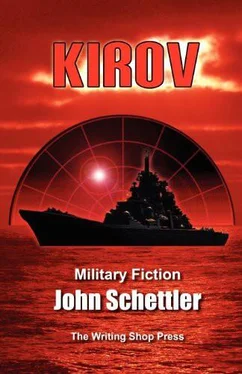John Schettler - Kirov
Здесь есть возможность читать онлайн «John Schettler - Kirov» весь текст электронной книги совершенно бесплатно (целиком полную версию без сокращений). В некоторых случаях можно слушать аудио, скачать через торрент в формате fb2 и присутствует краткое содержание. Жанр: Фантастика и фэнтези, Альтернативная история, на английском языке. Описание произведения, (предисловие) а так же отзывы посетителей доступны на портале библиотеки ЛибКат.
- Название:Kirov
- Автор:
- Жанр:
- Год:неизвестен
- ISBN:нет данных
- Рейтинг книги:5 / 5. Голосов: 1
-
Избранное:Добавить в избранное
- Отзывы:
-
Ваша оценка:
- 100
- 1
- 2
- 3
- 4
- 5
Kirov: краткое содержание, описание и аннотация
Предлагаем к чтению аннотацию, описание, краткое содержание или предисловие (зависит от того, что написал сам автор книги «Kirov»). Если вы не нашли необходимую информацию о книге — напишите в комментариях, мы постараемся отыскать её.
Kirov — читать онлайн бесплатно полную книгу (весь текст) целиком
Ниже представлен текст книги, разбитый по страницам. Система сохранения места последней прочитанной страницы, позволяет с удобством читать онлайн бесплатно книгу «Kirov», без необходимости каждый раз заново искать на чём Вы остановились. Поставьте закладку, и сможете в любой момент перейти на страницу, на которой закончили чтение.
Интервал:
Закладка:
“The British say this raider can steam up at thirty knots or more, Rey,” said Starke. “ Mississippi can push it at 23 knots if she’s lucky. This is work for fast cruisers-and for that matter, we’ve got the President here aboard one, and we need to get him safely off this ship.”
King reluctantly agreed, gave the order to pull back Task Force 16, but the old “son-of-a-bitch” wasn’t happy, and he let everyone around him know it. Earlier, he had given his destroyer captains orders to be aggressive at sea if they encountered German U-Boats, and he had also formulated numerous plans on how to deal with German surface raiders. He had even considered the Graf Zeppelin in his schemes, and directed that this ship would be fair game for cruisers and destroyers if ever encountered at sea.
Though he was leery of British intelligence on the matter, when he learned that the Royal Navy believed they were pursuing this German aircraft carrier he wanted to get there first. So he sent the fast destroyers of Desron 7 out ahead telling them to fuel up as fast as they could and take up a screening position off the cape of Newfoundland. And he told Captain Wright on the Mississippi to hover just behind that screen until other warships could augment his force for the hunt he was now determined to pursue in earnest.
“The only thing now,” he said “is whether we can get this bastard before the Brits do! If they catch and sink this ship first, they’ll crow about how they saved the U.S. Navy for the next hundred years. Well, I’m not going to stand for that. They come over here, hat in hand, and I’d like to drop this little trophy into their bag, courtesy of the United States Navy. Then we can get on with the real business of this war-the damn Japanese. If Roosevelt manages to get congress to declare war on Germany over this, then Tojo and his samurai brotherhood will fall right in line beside Hitler. That’s where the Navy’s fight will be in the end, not out here garrisoning Iceland and holding hands with Convoy Masters.”
Aboard Kirov, another “son-of-a-bitch” was angry as well. Karpov had a heated discussion with the Admiral, leaving sick bay unsatisfied, and quite unhappy. Volsky had been adamant that no nuclear warheads were to be mounted on any of the missiles except on his expressed order. The Captain had argued about it with him, implored him to see the logic of their situation, but he closed ranks with Zolkin and refused to listen. He gave him orders not to engage in any further combat, and even went so far as to threaten to remove him from the bridge watch if he persisted with these ideas, an insult that enraged the Captain to no end, particularly in front of the Doctor. All he had done was plead with the Admiral to allow the ship to mount the weapons in the event they needed them ready for quick action. But Volsky was adamant.
Karpov went to his quarters, stewing over the matter for some time, frustrated that he could not have simply collected the Admiral’s command key and passed it on to Orlov as he had hoped. And the Doctor was no help either. Zolkin was clearly running interference for the Admiral, supporting his arguments at every opportunity, and even going so far as to suggest that the Captain was overly stressed, a statement which Karpov vehemently refuted.
The Captain sat in his bunk, a nervous frustration keeping him from sleep, which he dearly needed now. Chastened by the Admiral, his old doubts and fears began to re-emerge. It was clear to him that the brief window of command he had enjoyed was closing, and that Volsky would soon be casting his considerable shadow on the bridge again. The tension of these last hours had been hard on him, in spite of his resolve to do what he believed he must in the situation. If he could just get a few hours sleep while Orlov held the watch, he could clear his head a bit.
Restless, and discontented, he took a book from his cabin and lay down on the bunk to read. It was an old favorite, Dostoevsky’s Notes From The Underground, the same book he had quoted to Fedorov on the bridge earlier. He opened it, flipping through the pages, and his eye fell on a segment he had bookmarked many years ago when he last read the book in earnest.
Dostoevsky had been talking about the injustice of life, and the cruelty of fate, comparing man to a pantry mouse thirsting for just a little revenge. “Now let us look at this mouse in action. Let us suppose, for instance, that it feels insulted, too (and it almost always does feel insulted), and wants to revenge itself. Through his innate stupidity a man looks upon his revenge as justice, pure and simple; while the mouse does not believe in the justice of it. To come at last to the deed itself, to the very act of revenge, the luckless mouse succeeds in creating doubts and questions…there inevitably works up around it a sort of fatal brew, a stinking mess, made up of its doubts, emotions… Of course the only thing left for it is to dismiss all that with a wave of its paw, and creep ignominiously into its mouse hole. ”
He paused, an ashen, disconsolate look on his face. Here he was, tucked away in his mouse hole. He knew what he wanted to do, what he should do, and yet, he had done exactly what Dostoevsky said. He had worked himself up with questions, and reasons and doubts, that same fatal brew that so confounds the mouse in every man’s heart. He was ashamed of himself for not being stronger than he was. What was all his conniving and planning and bluster for if, in the end, he could not be a man instead of this confused little mouse? His tired eyes strayed again over the well worn text, and the words scolded him, leaping off the tattered pages of the book that he had read so many times.
“There in its nasty, stinking, underground home our insulted, crushed and ridiculed mouse promptly becomes absorbed in everlasting spite. For forty years together it will remember its injury down to the smallest, most ignominious details… Maybe it will begin to revenge itself, too, but, as it were, piecemeal, in trivial ways, knowing that from all its efforts at revenge it will suffer a hundred times more than he on whom it revenges itself.”
That was the story of his life, thought Karpov. He had sulked in his mouse hole, and slipped out in the dark to steal one man’s cheese and another’s bread. And yes, he had oh so carefully avoided all the mouse traps, dodged the hard coiled springs that might snap down on his tail and catch him, particularly after Gazprom. He had crept about the big drafty old mansion that his country had become for forty years, and brought pain and suffering to more than one rival in all that time. All it had brought him was this aching sense of isolation and doubt when things came right down to this last awful moment when he suffered the final humiliation, dressed down by Volsky like that, right in front of the Doctor! Now he knew that all these years he had indeed been a mouse, and not a man. When it came down to the pitting of his will against that of a man like Volsky, here he was in his mouse hole again, reading books.
He flipped ahead, noting a passage he had underlined where Dostoevsky’s character had described his inability to enact the vengeance he had spoken of on a fellow officer and rival.
“I did not slink away through cowardice,” he read on, “but through an unbounded vanity. What I was afraid of was that everyone present would jeer at me and fail to understand when I began to protest… I stared at him with spite and hatred and so it went on… for several years! My resentment grew even deeper with years. In this way everything was at last ready. It would never have done to act offhand, at random; the plan had to be carried out skillfully, by degrees… I made every preparation, I was quite determined — it seemed as though we should run into one another directly — and before I knew what I was doing I had stepped aside for him again and he had passed without noticing me. One time I had made up my mind thoroughly, but it ended in my stumbling and falling at his feet because at the very last instant when I was six inches from him my courage failed me.”
Читать дальшеИнтервал:
Закладка:
Похожие книги на «Kirov»
Представляем Вашему вниманию похожие книги на «Kirov» списком для выбора. Мы отобрали схожую по названию и смыслу литературу в надежде предоставить читателям больше вариантов отыскать новые, интересные, ещё непрочитанные произведения.
Обсуждение, отзывы о книге «Kirov» и просто собственные мнения читателей. Оставьте ваши комментарии, напишите, что Вы думаете о произведении, его смысле или главных героях. Укажите что конкретно понравилось, а что нет, и почему Вы так считаете.












